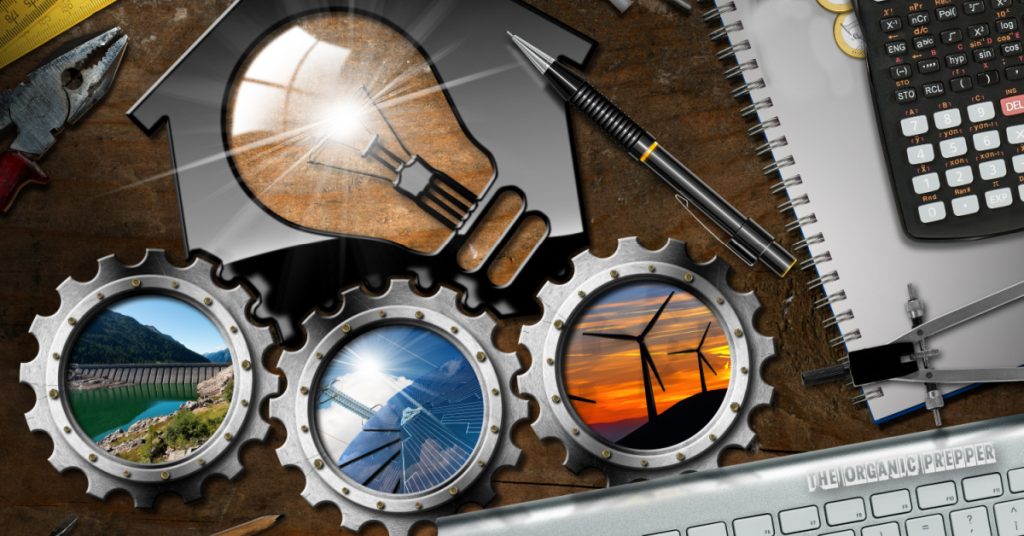by Mike Roth, The Organic Prepper:

Are you searching for dependable alternative energy solutions as a prepper or survivalist? Given the fragility of the power grid in disaster scenarios, investing in reliable and sustainable power generation is necessary for maintaining safety and connectivity.
Delving into renewable energy sources like solar, wind, and hydropower, this article offers insights into diverse power solutions and their setup requirements.
We will provide the following:
TRUTH LIVES on at https://sgtreport.tv/
- A comprehensive overview of these energy alternatives.
- Exploring their roles in prepping.
- The pros and cons.
- The critical factors in selecting the ideal power source are tailored to your needs and circumstances.
While some folks are already totally off-grid, the rest of us are still looking for answers. Equipping yourself with this knowledge empowers you to harness nature’s power effectively, fortifying your preparation for any contingency.
Solar Power – Definition and Explanation
Solar is a renewable energy source that harnesses the energy from the sun and converts it into electricity.
The technology behind solar power has come a long way since its inception in the seventh century, and it is now one of the most significant green energy sources available. It is an environmentally friendly power source that is plentiful, cost-effective, and easy to maintain. Solar power is a great option for preppers and survivalists looking for alternative sources of energy to traditional sources.
Advantages and disadvantages of using solar power
Solar power is considered one of the most popular and widely used forms of alternative energy.
One of the biggest advantages of using solar power is that it is a renewable source of energy that doesn’t produce any harmful emissions or greenhouse gases. It also helps to reduce dependence on fossil fuels, a finite resource becoming increasingly scarce.
However, the initial cost of installing a solar system can be quite expensive, and the storage of solar energy can also be costly.
Moreover, solar power is weather dependent, and during periods of low solar activity, homeowners may need to rely on other power sources. Read more here and here.
Factors to consider when using solar power
Several factors need to be considered when solar power is an alternative energy source for prepping and survival planning.
Firstly, the location of the area and the specific micro-climate should be analyzed to determine the amount of direct sunlight available and the optimal positioning of solar panels.
Other important factors include the cost of initial installation and maintenance, the lifespan of the panels, and the need for a battery backup system to provide power during periods of low sunlight.
Additionally, the system’s capacity should match the prepper’s or survivalist’s energy requirements to ensure a sufficient power supply.
Hydroelectric Power Definition and Explanation
Hydroelectric power, also known as hydropower, is a renewable energy source that harnesses the natural flow of moving water to generate electricity.
It works by using a dam or reservoir to trap water and create a height difference between the water levels on both sides of the dam.
The water flows through a small tunnel with turbines that generate electricity from an attached generator.
Hydropower accounts for about 28.7% of total U.S. renewable electricity generation and approximately 6.2% of total U.S. electricity generation.
It is also a cost-effective source of electricity that costs less than most other sources.
However, large-scale conventional hydropower dams significantly impact the environment, including displacement of people, loss of valuable farmland and wildlife habitats, and disruption of natural river flow.
Advantages and disadvantages of using hydroelectric power
Hydroelectric power is a popular alternative energy source due to its renewable nature and reliable energy production.
It is also considered inexpensive in the long run and associated with job creation and economic benefits.
However, environmental concerns are associated with constructing hydroelectric plants, including the potential disruption of natural river flow and impacts on wildlife.
Additionally, the reliance on river water for energy production makes hydroelectricity susceptible to droughts, which can limit its capacity.
Read More @ TheOrganicPrepper.ca



